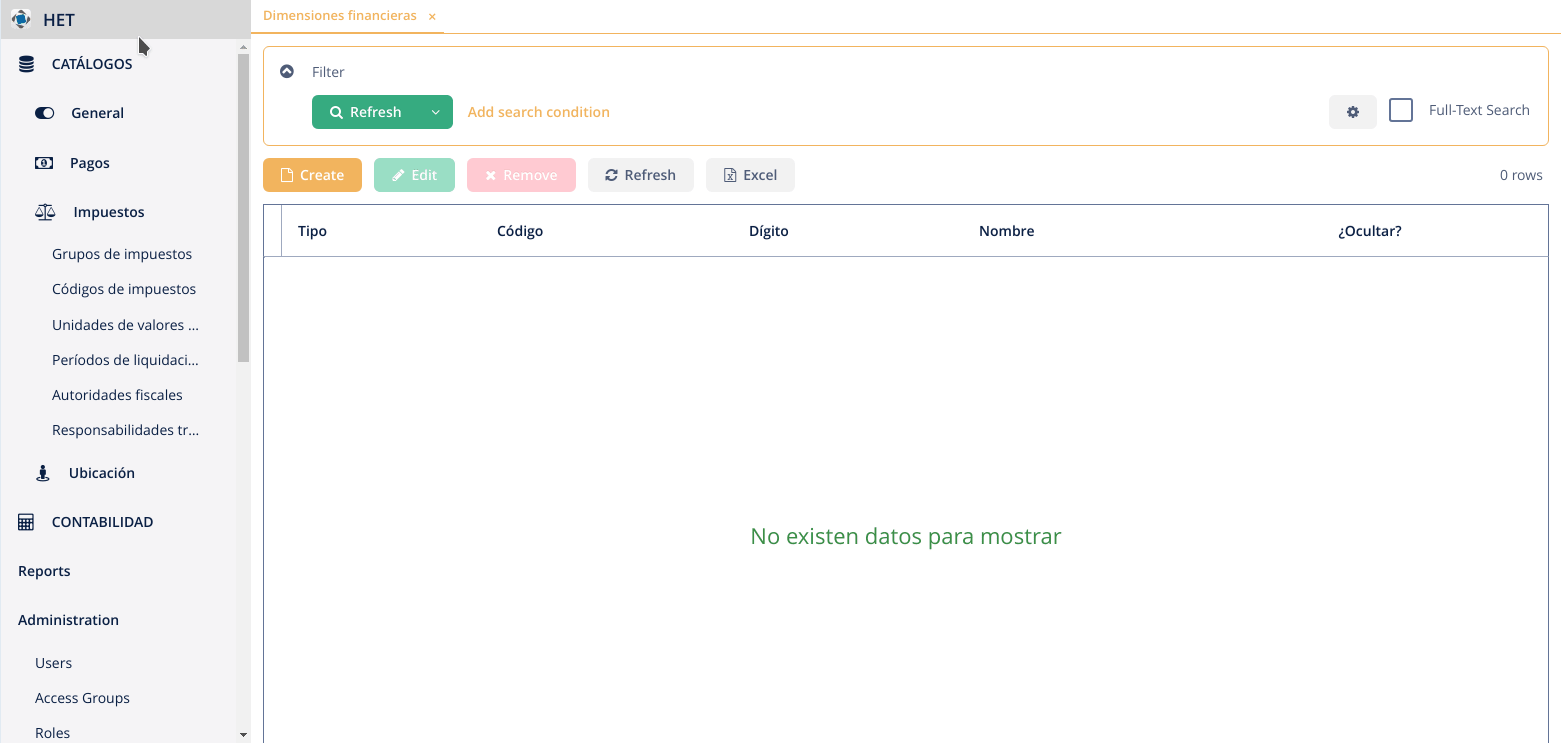I’m trying to get the TokenList component to work, it’s supposed to be correctly configured but when I try to use it it just doesn’t work and doesn’t flag an error either.
I’ve got the following:
Fiscal responsability entity
@NamePattern(value = "%s|description")
@Table(name = "HET_FISCAL_RESPONSIBILITY", indexes = [
Index(name = "IDX_HET_FISCAL_RESPONSIBILITY_01", columnList = "DESCRIPTION")
], uniqueConstraints = [
UniqueConstraint(name = "IDX_HET_FISCAL_RESPONSIBILITY_UNQ", columnNames = ["IDENTIFICATION"])
])
@Entity(name = "het_FiscalResponsibility")
class FiscalResponsibility : BasicField() {
companion object {
private const val serialVersionUID = -1225558278840943983L
}
}
Relational entity (detail)
@NamePattern(value = "%s|fiscalResponsability")
@Table(name = "HET_INTERNATIONAL_FSCL_RSPNSBLTY", uniqueConstraints = [
UniqueConstraint(name = "IDX_HET_INTERNATIONAL_FISCAL_RESPONSABILITY_UNQ", columnNames = ["INTERNATIONAL_MARKETER_ID", "FISCAL_RESPONSABILITY_ID"])
])
@Entity(name = "het_InternationalFiscalResponsability")
class InternationalFiscalResponsability : Identificador() {
@OnDeleteInverse(DeletePolicy.CASCADE)
@Lookup(type = LookupType.DROPDOWN, actions = [])
@NotNull
@ManyToOne(fetch = FetchType.LAZY, optional = false)
@JoinColumn(name = "INTERNATIONAL_MARKETER_ID")
var internationalMarketer: InternationalMarketer? = null
@Lookup(type = LookupType.DROPDOWN, actions = [])
@OnDeleteInverse(DeletePolicy.DENY)
@ManyToOne(fetch = FetchType.LAZY)
@JoinColumn(name = "FISCAL_RESPONSABILITY_ID")
var fiscalResponsability: FiscalResponsibility? = null
companion object {
private const val serialVersionUID = 5799073036678630010L
}
}
Master Entity
@NamePattern(value = "%s|businessName")
@Table(name = "HET_INTERNATIONAL_MRKTR", uniqueConstraints = [
UniqueConstraint(name = "IDX_HET_INTERNATIONAL_MARKETER_UNQ", columnNames = ["IDENTIFICATION"])
])
@Entity(name = "het_InternationalMarketer")
@Listeners("het_InternationalMarketerListener")
class InternationalMarketer : Identificador() {
@NotNull
@Column(name = "IDENTIFICATION", nullable = false, length = 20)
var identification: String? = null
@Lookup(type = LookupType.DROPDOWN, actions = ["lookup", "open"])
@NotNull
@OnDeleteInverse(DeletePolicy.DENY)
@ManyToOne(fetch = FetchType.LAZY, optional = false)
@JoinColumn(name = "IDENTIFICATION_TYPE_ID")
var identificationType: IdentificationType? = null
@NotNull
@Column(name = "BUSINESS_NAME", nullable = false, length = 120)
var businessName: String? = null
@NotNull
@Column(name = "PERSON_TYPE", nullable = false)
private var personType: Int? = null
@Lookup(type = LookupType.DROPDOWN, actions = ["lookup", "open"])
@NotNull
@OnDeleteInverse(DeletePolicy.DENY)
@ManyToOne(fetch = FetchType.LAZY, optional = false)
@JoinColumn(name = "CURRENCY_ID")
var currency: Currency? = null
@Lookup(type = LookupType.DROPDOWN, actions = ["lookup", "open"])
@NotNull
@OnDeleteInverse(DeletePolicy.DENY)
@ManyToOne(fetch = FetchType.LAZY, optional = false)
@JoinColumn(name = "CIIU_CODE_ID")
var ciiuCode: CiiuCode? = null
@Composition
@OnDeleteInverse(DeletePolicy.CASCADE)
@OneToMany(mappedBy = "internationalMarketer", cascade = [CascadeType.PERSIST])
var responsibilities: MutableList<InternationalFiscalResponsability>? = mutableListOf()
fun getPersonType(): PersonType? = personType?.let { PersonType.fromId(it) }
fun setPersonType(personType: PersonType?) {
this.personType = personType?.id
}
companion object {
private const val serialVersionUID = 9042427494405307321L
}
}
in my editor
<data>
<instance id="internationalMarketerDc"
class="com.treze.sw.het.entity.catalogs.generals.InternationalMarketer"
view="internationalMarketer-view">
<loader/>
<collection id="responsibilitiesDc" property="responsibilities"/>
</instance>
</data>
<collection id="fiscalResponsibilityDc" class="com.treze.sw.het.entity.catalogs.taxes.FiscalResponsibility"
view="_minimal">
<loader id="fiscalResponsibilityLc">
<query>
<![CDATA[select e from het_FiscalResponsibility e where e.hidden <> true order by e.description asc]]>
</query>
</loader>
</collection>
<layout expand="optionBox" spacing="true">
<form dataContainer="internationalMarketerDc">
<column width="740px">
<tokenList dataContainer="responsibilitiesDc" property="fiscalResponsability" inline="true">
<lookup optionsContainer="fiscalResponsibilityDc"/>
<clearButton caption="" icon="font-icon:REMOVE"/>
</tokenList>
</column>
</form>
</layout>
All of the above should work, but it doesn’t.

I appreciate any help.
Regards,
Nelson F.